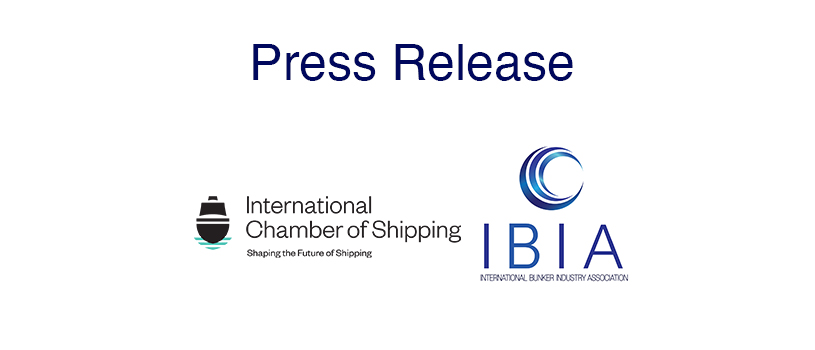Simplified Global GHG Fuel Standard for marine fuels put forward to help meet net zero target
- The International Chamber of Shipping (ICS) and the International Bunker Industry Association (IBIA) have joined forces to submit a proposal for a simplified Global GHG Fuel Standard for the next round of International Maritime Organization (IMO) greenhouse gas negotiations.
- The ICS/IBIA proposal provides for a crucial streamlined voluntary “energy pooling compliance mechanism” to address the possibility of fuel producers being unable to supply new fuels in sufficient quantities.
- To ensure agreement at IMO by 2025, industry’s simplified approach will minimise administrative burden for governments, especially for developing countries, whose support will be vital to taking the fuel standard forward globally.
20 November 2023, London: The International Chamber of Shipping (ICS), which represents over 80% of the world’s merchant fleet, and the International Bunker Industry Association (IBIA), which represents the global bunker industry, have submitted a joint proposal to the shipping industry’s global regulator – the UN International Maritime Organization (IMO) – for a Global GHG (greenhouse gas) Fuel Standard.
Following the agreement in July 2023 by IMO Member States of a net zero GHG emission target for shipping, and that a new suite of GHG reduction regulations should be adopted in 2025, ICS and IBIA have submitted their simplified proposal to the next round of IMO negotiations in March 2024.
The objective is to progressively reduce the GHG intensity of marine fuels and create a market for the production of zero and near zero GHG fuels, to help ensure achievement of the net zero GHG emissions target by 2050.
Within the proposal, ICS and IBIA set out draft amendments to Annex VI of the MARPOL Convention in terms of maximum permitted GHG intensity of marine fuels in 2030, to be followed by an aggressive tightening of this standard in 2040.
In addition to helping to make achievement of net zero emissions possible, the initial GHG intensity standard set for 2030 will support shipping to meet the new IMO target (also adopted by governments in July 2023) that between 5% and 10% of the energy used by shipping must be generated by 2030 from zero or near-zero energy sources. The exact standard for the required reduction in the GHG intensity of marine fuel would be subject to negotiation between governments.
Significantly, the ICS/IBIA proposal provides for a crucial streamlined voluntary “energy pooling compliance mechanism” to address the possibility of fuel producers being unable to supply new fuels in sufficient quantities. This will allow for ships to continue to trade should sufficient quantities of fuels of the required GHG intensity not be made available by energy producers, but without increasing the sector’s total GHG emissions.
Simon Bennett, Deputy Secretary General of the International Chamber of Shipping, explained:
“The International Chamber of Shipping recognises the importance of meeting our decarbonisation targets, not only for shipping but for the world. Our joint proposal provides flexibility to enable compliance by ships should fuels of the required GHG intensity not always be available. This simplified approach avoids the need for an overly complex system, as proposed by the European Union, whereby “compliance units” or “remedial units” would need to be registered with or purchased from a central IMO registry.”
“The proposed method of pooled compliance would be a private arrangement between shipping companies and would avoid unnecessary administrative burden for governments, including developing countries’ administrations whose support will be vital to move forward at IMO.”
Edmund Hughes, IBIA’s representative at IMO, added:
“The bunker industry fully supports an internationally agreed GHG fuel standard for 2030 which will help to create a global market for marine fuels with a reduced GHG intensity, including sustainable biofuels largely supplied as blends which many existing ships are expected to use to enable them to comply. We fully agree with shipowners, as represented by ICS, that the design of the global fuel standard needs to be kept as simple as possible if, as identified by the 2023 IMO GHG Strategy, governments wish to have a workable system in place within the next 18 months, that can be uniformly and consistently implemented and that keeps the administrative burden for bunker operators and suppliers to a minimum”.
The ICS/IBIA joint proposal will be considered by an IMO intersessional working group on GHG reduction in March 2024, immediately preceding the next critical meeting of the IMO Marine Environment Protection Committee (MEPC81).
The proposal is designed to support a global economic measure to ensure that they work together to deliver on the IMO’s revised strategy.
Ends
Notes to Editors:
The ICS/IBIA submission to IMO can be found here.
About ICS
The International Chamber of Shipping (ICS) is the principal international trade association for merchant shipowners and operators, representing all sectors and trades and over 80% of the world merchant fleet – www.ics-shipping.org.
About IBIA
The International Bunker Industry Association (IBIA) is the voice for the global bunker industry across all sectors and the entire industry value chain. The Association represents stakeholders in discussions and negotiations with other industry associations, national and international policy makers and legislators, including IMO where IBIA has consultative NGO status. IBIA promotes the common good of the industry through education, fostering professional conduct and developing standards – www.ibia.net.
